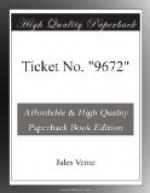“If you but knew how easy that will be!” replied Hulda, offering him her hand. “Am I not that already, and is there a home in all Dal as pleasant as ours?”
Dame Hansen hastily averted her head.
“So the matter is settled?” asked Ole, cheerfully.
“Yes,” replied Joel.
“And settled beyond recall?”
“Certainly.”
“And you feel no regret, Hulda?”
“None whatever, my dear Ole.”
“I think, however, that it would be better not to appoint the day for your marriage until after your return,” remarked Joel.
“Very well, but it will go hard with me if I do not return in less than a year to lead Hulda to the church at Moel, where our friend, Pastor Andersen, will not refuse to make his best prayer for us!”
And it was in this way that the marriage of Hulda Hansen and Ole Kamp had been decided upon.
The young sailor was to go aboard his vessel a week later; but before they parted the lovers were formally betrothed in accordance with the touching custom of Scandinavian countries.
In simple and honest Norway lovers are almost invariably publicly betrothed before marriage. Sometimes the marriage is not solemnized until two or three years afterward, but one must not suppose that the betrothal is simply an interchange of vows which depend only upon the honesty of the parties interested. No, the obligation is much more sacred, and even if this act of betrothal is not binding in the eyes of the law, it is, at least, so regarded by that universal law called custom.
So, in this case, it was necessary to make arrangements for a ceremony over which Pastor Andersen should preside. There was no minister in Dal, nor in any of the neighboring hamlets. In Norway they have what they call Sunday towns, in which the minister resides, and where the leading families of the parish assemble for worship. They even lease apartments there, in which they take up their abode for twenty-four hours or more—time to perform their religious duties—and people return from the town as from a pilgrimage.
Dal, it is true, boasted of a chapel, but the pastor came only when he was summoned.
After all, Moel was not far off, only about eight miles distant, at the end of Lake Tinn, and Pastor Andersen was a very obliging man, and a good walker; so the worthy minister was invited to attend the betrothal in the twofold capacity of minister and family friend. The acquaintance was one of long standing. He had seen Joel and Hulda grow up, and loved them as well as he loved that young sea-dog, Ole Kamp, so the news of the intended marriage was very pleasing to him.
So Pastor Andersen gathered together his robe, his collar, and his prayer-book, and started off for Dal one misty, moisty morning. He arrived there in the company of Joel, who had gone half-way to meet him, and it is needless to say that his coming was hailed with delight at Dame Hansen’s inn, that he had the very best room in the house, and that the floor was freshly strewn with twigs of juniper that perfumed it like a chapel.




